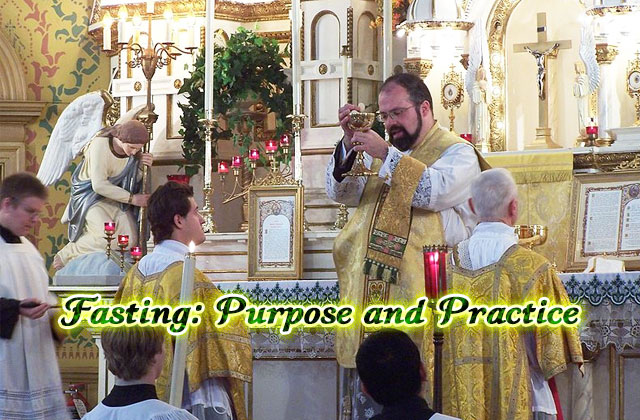Fasting is a spiritual doctrine that is setting aside something physical and replacing it with something spiritual. Nearly every religion on the planet has a fast either recommended occasionally, required regularly, or somewhere in between. The purpose is to purposefully focus on God for a time. It could be for power, for repentance, or for renewal.
Fasting requires self-control and self-discipline. It is not meant as a method of weight control or a way to attempt to force God to do something one desires, and it should definitely never be used as a way to publicly show people how spiritual one is. It is meant to be a way to direct one’s hunger or desires toward God, to adjust focus and learn to trust God completely.
Fasting is used by a variety of Christian denominations, and also other religions. These include Baha’i, Buddhism, Hinduism, paganism, Muslim, Mormonism, Catholicism, Orthodoxy, Judaism, Baptist, Methodist, and others. Some have certain fast days set that is observed every year (or month, or week), while others’ adherents fast at their own discretion.
For example, Catholics fast from meat on Fridays in Lent (until the 1960s, it was every Friday), as well as Ash Wednesday and other times such as Advent (December), Pentecost (in the spring), All Saints (October 31), and the Assumption (August).
Many Catholics choose foods or other earthly pastimes to abstain from during the entirety of Lent, giving us the saying “giving it up for Lent.”Lent is 40 days beginning on Ash Wednesday and ending just before Easter Sunday – a period of about six weeks. The purpose of Lent is to pray, practice self-denial and almsgiving, and repent of sins, and fasting helps believers to direct their focus to these pursuits.
Those who follow Jewish tenets have a variety of fast days, including Yom Kippur and Tisha B’Av. The latter is a time of mourning in memory of tragedies that have happened to the Jewish people. These include the destruction of the first and second temples, both of which occurred on the ninth day of the month called Av – the first in 586 BC, and the second in 70 AD.

Fasting does not necessarily require one to completely abstain from food, though that is the most common interpretation, and the format most often used. Some choose to fast by ingesting nothing (not even water), though that is less common (possibly due to health restrictions). However, most of the Catholic and Eastern Orthodox fasts involve abstaining from meat and dairy, especially if refusing all foods would be detrimental (for a pregnant woman, perhaps, or an elderly person). Some people choose to observe fasting by abstaining from other things, such as sugar, time on the computer, smoking, sex, or other earthly desires.

The Bible has many examples of God’s people fasting, in both the Old and New Testaments.
While fasting for an extended period (usually 40 days) wasn’t common, it did happen several times. Moses and Elijah both are recorded as fasting for 40 days: Moses did because of the sin of Israel, and Elijah did because he was in mortal danger from the queen. Others who fasted because of Israel’s sin or their own sin included David (several times), Ahab, Daniel, and Ezra, as well as the entire city of Ninevah. Other reasons for fasting were danger (Darius and Esther) and sadness over disrepair (Nehemiah and the walls of Jerusalem).
In the New Testament, we see the disciples of John the Baptist, Anna, the elders in Antioch (in preparation for sending Paul and Barnabas to minister), Cornelius (in search of salvation), and Paul, twice: once immediately after meeting Jesus on the Damascus road, and once on a sinking ship at sea.
Most notably, we see Jesus fasting for 40 days before beginning His public ministry. In this situation, Jesus departed to a wilderness area and ingested nothing. Along with the deprivation of sustenance, Jesus also had to deal with temptation from His enemy, Satan. While today’s Christians are not necessarily faced with the same temptations Jesus faced, it is true that believers will be faced with temptations, especially during times of fasting.
It is believed that early Christians observed fast days weekly on both Wednesday and Friday, while Jews of the same era usually observed fasting days on Monday and Thursday. While this is no longer followed, as a rule, there are likely still some adherents who choose to fast weekly on a regular basis.
Fasting is generally understood to be a practice to encourage a healthy spiritual life, but fasting from food and/or drink also has an effect on the physical body. This effect can be beneficial or detrimental, depending on several factors. Some of these include how long, how often, and overall health.
Fasts can last for mere hours (for example, overnight is considered a fast – thus the name of the first meal of the day being “breakfast” or breaking of the fast) to several days. Skipping one meal can be just as effective spiritually as skipping days of eating, without the potential negative physical effects.
Fasting occasionally can be a healthful pursuit, both spiritually and physically. Some choose to fast weekly, some monthly, and others less often but still at regular intervals. Others choose to fast when they feel they need to, regardless of the calendar.
One’s overall health Is a very important factor. If a person is generally unhealthy to begin, a fast from all food and drink can be more detrimental than beneficial. It may be wise, to begin with a fast from sugar, or refined foods, or grains – foods that may contribute to inflammation in the body – which will allow the body to repair itself in preparation for a more rigorous fast. Cortisol – the stress hormone – is also increased during fasting, so it is helpful to have that under control before a complete fast. Additionally, if a person is pregnant or diabetic, complete fasting may be contraindicated, but modified fasting can still be utilized for spiritual health without causing harm to the body.
The most important part of fasting and prayer is the prayer, however, so if you choose to experience fasting, remember to include prayer, as well.

